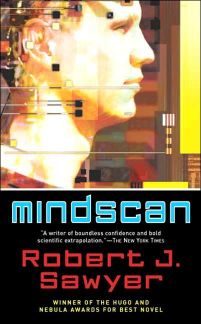Mindscan posthumanism questions

Got asked some interesting questions about Mindscan this morning by a university student studying the book in a fourth-year honours seminar on "The Rhetoric of the Posthuman."
1. What do you mean by "uploading" (uploading consciousness? feelings? factor x?) and what do you believe are the consequences of this?
That's the crux of the whole novel. What is personhood? Do we have souls? And, if we don't, what makes you the real you and a copy of you somehow ersatz? In the context of the novel, what's being copied is the quantum-mechanical states of the microtubules in your brain -- the seat of consciousness in the Penrose-Hameroff model. Is that what you are? If others can't tell the difference by the way you respond to questions, then the answer is yes for all meaningful purposes.
2. Are you a proponent for a posthuman future? Is it degrading in your opinion?
I'm not a proponent per se; I'm still wrestling with the issue of whether it's really the same person. But I do think it's very unfortunate that some people squander what time they have in their normal, biological life in vague hopes of some other existence later on -- but I feel the same way about those who shortchange this existence for the sake of some putative afterlife. As to whether it's degrading, well, having worms eat your flesh as you rot in the ground is literally degrading; becoming an android or uploading your consciousness into a computer is no worse, surely, and arguably much better.
3. Do you think there would be an existential threat if posthumans existed? (The consequences for the original Jake in your novel trigger this question ... I wonder if he would he have done whatever he could to get his old life back).
There's an existential threat because people believe in the afterlife -- suicide bombers are deluded into thinking they're going to heaven. That's a much, much greater threat to humanity than people who want to live longer in this existence -- because at least those who are trying to prolong their time in this realm have a vested interested in not wrecking the place up too badly. The worst thing that can be said about most of those pursuing posthumanism is that they are perhaps narcissistic -- they love themselves too much.
On the other hand, those pursuing the religious afterlife are often misanthropic, and that can be much, much worse. (In the novel, I went to pains to establish that Jake's quest was not to have an extended, superhuman life, but rather to simply have the normal life most people got, instead of dying young or -- worse -- ending up in a vegetative state for decades.)
For more about Mindscan by Robert J. Sawyer, see here.
The Robert J. Sawyer Web Site



0 Comments:
Post a Comment
<< Home